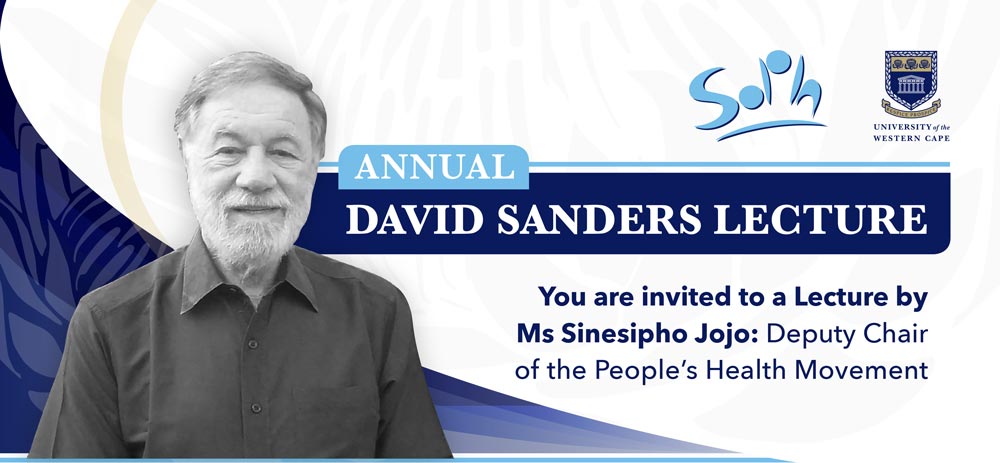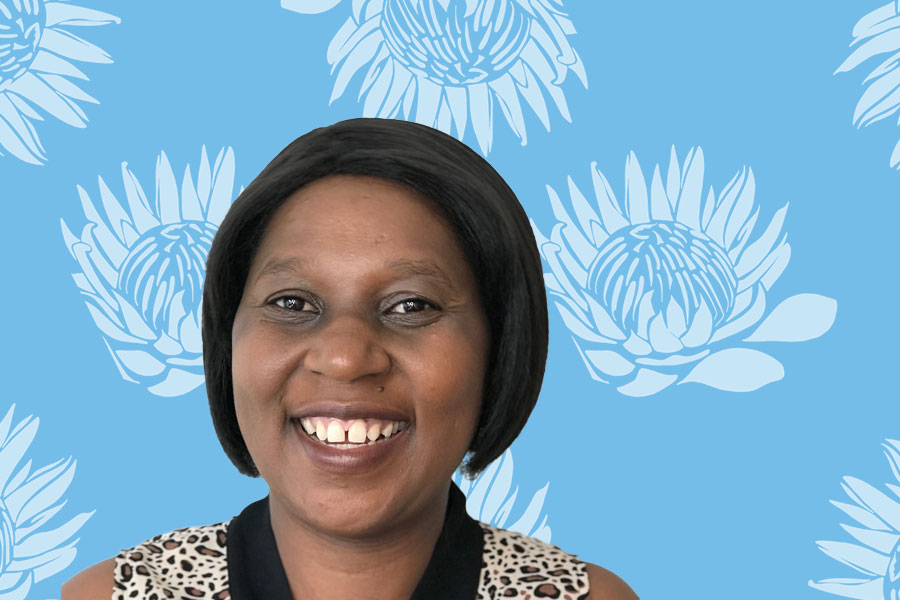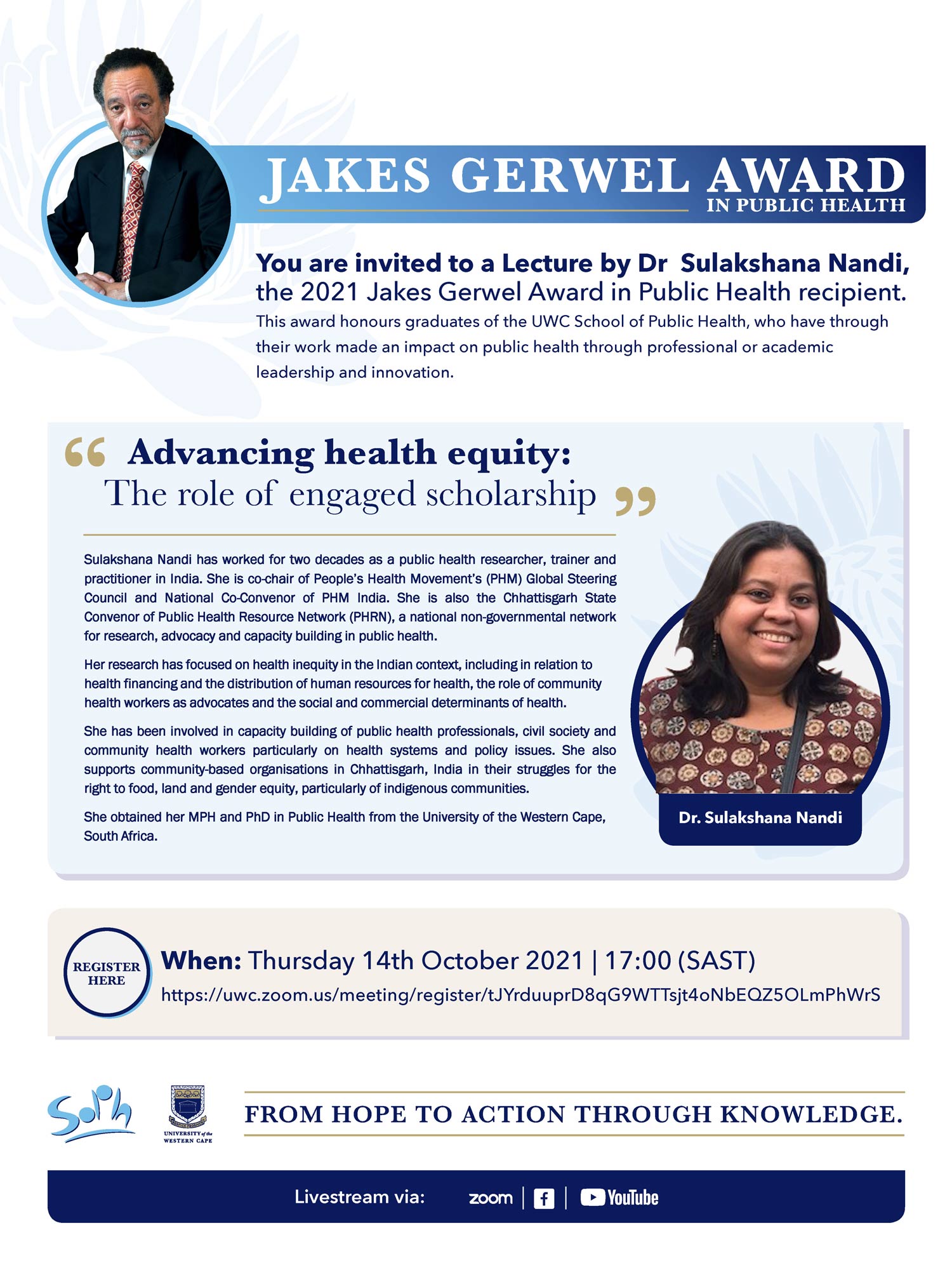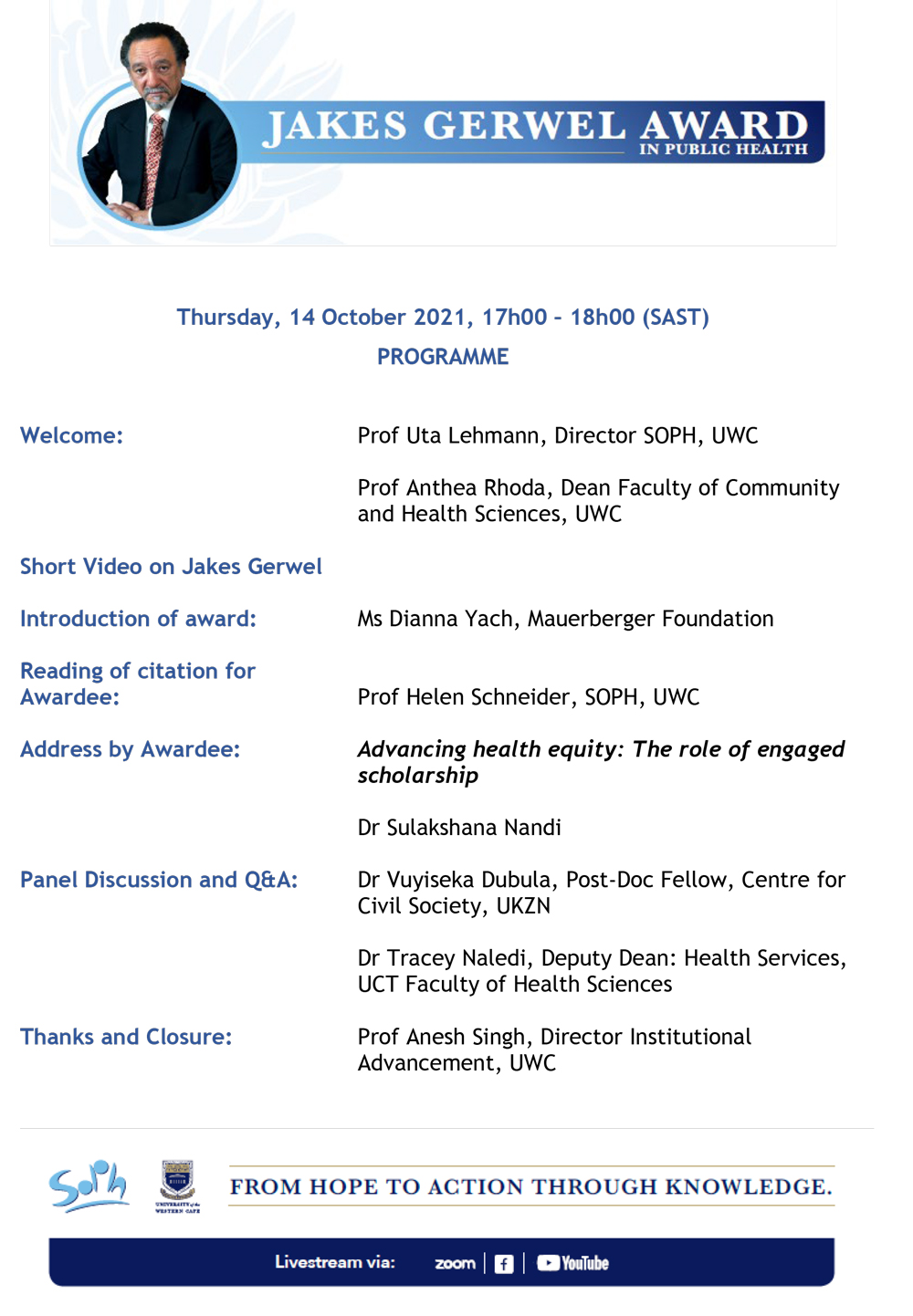
2021 David Sanders Lecture – COVID-19 and Social Justice
9 September 2021
Participatory systems analysis tools for improved health systems performance.
17 September 2021Jakes Gerwel Award 2021: Sulakshana Nandi
This award honours graduates of the UWC School of Public Health, who have through their work made an impact on public health through professional or academic leadership and innovation.
Citation for Sulakshana Nandi, MPH, PhD
Sulakshana trained as a social worker and was part of a cohort of Indian activists in the People’s Health Movement (PHM) who chose to do post-graduate training in public health at UWC, a link supported and encouraged by the late Professor David Sanders. Sulakshana completed both her Masters in Public Health (awarded cum laude) and PhD (awarded in 2020) at the SoPH.
Over the past 20 years, Sulakshana has been a leader of non-governmental social mobilisations on issues of health, gender, food security and socio-economic rights in India. In 2006, she was a founding member of ‘Chaupal’ – a resource agency that has played a critical role in supporting community based organisations through research, capacity building and advocacy on issues of health, nutrition and gender in the tribal areas of Chhattisgarh. She also played a major part in the development of the globally recognised Mitanin (community health worker) programme in Chhattisgarh, providing key inputs into the design of training modules and supporting its implementation. The Mitanin Programme provided the template for the subsequent development of the nation-wide Accredited Social Health Activist (ASHA) CHW programme, and Sulakshana is currently a member of the ASHA’s national mentoring team.
Sulakshana’s health activism goes well beyond India. After being nominated to represent India in PHM in 2019, she was elected co-chair of PHM’s Global Steering Council. PHM brings together grassroots health activists, civil society organizations and academic institutions from 70 countries around the world, particularly from low and middle income countries. PHM has been a critically important and influential global voice for a socially just vision of health and health care, especially relevant in the face of powerful neo-liberal discourses in the field referred to as ‘global health’.
Sulakshana’s activist themes have informed her scholarship in a mutually beneficial manner. Her MPH mini-thesis dissertation evaluated the role of the Mitanins in tackling the complex and socially determined challenges of nutrition and gender based violence. This research was subsequently published in Health Policy and Planning, selected as part of a special issue from the 2014 Global Symposium on Health Systems Research.[1]
While she was completing this research, Sulakshana became increasingly involved in national debates on a publicly funded health insurance scheme (RSBY) to subsidise care in India’s private hospital sector. She chose this as the topic for her PhD, because:
“Living and working in Chhattisgarh with indigenous communities as RSBY unfolded, I was a witness to exactly what was and was not happening under the newly initiated PFHI scheme. In the community where I worked, poor families were being frequently and arbitrarily excluded from the scheme, or were unable to utilise the scheme due to various reasons. In the better-off areas people were getting hospitalised, apparently unnecessarily, for simple conditions. The gap between my observations of the irrelevance of RSBY, at least in the tribal areas where I was working, and public pronouncements touting Chhattisgarh as being one of the ‘best performing’ states under RSBY, made me want to find out more. I also simultaneously became aware of, and concerned about, new private sector dynamics, and the consequences of engaging and paying the private sector under the scheme which was more the case in the urban than the rural areas of the state.”
Sulakshana’s PhD is entitled: Equity, access and utilisation in the state funded universal insurance scheme (RSBY/MSBY) in Chhattisgarh State, India: What are the implications for Universal Health Coverage? Through a series of empirical studies in Chhattisgarh State, she demonstrated the failure of the publicly funded health insurance scheme to achieve its goals of improved affordability, access and equity of health care. Her four PhD papers[2],[3],[4],[5] raise important questions on the value of such financing models for advancing the globally advocated universal health coverage, particularly in the context of a highly commercialized private health sector, and provide lessons for other countries (including South Africa) embarking on similar reforms. Her doctoral work has enabled her to influence the direction of health system reforms in Chhattisgarh State while also positioning her as a national health system expert.
Through her life-long commitment to advancing social justice combined with a thirst for knowledge, Sulakshana thus epitomises the meaning of engaged or activist scholarship in health.
She described this positioning in her PhD thesis as follows:
“I have explicitly framed my role as a researcher in ‘solidarity work’ within social movements. Being an ‘insider’ to the issues has lent strength to my research. It helped me to develop a comprehensive understanding about PFHI [publicly funded health insurance] and identify its various facets. Working in the [Chhatttisgarh] state has helped me to develop trusting relationships with marginalised groups and engage them in research.”
She then goes further to describe the implications of this positioning:
“…my findings may be viewed by others as a reflection of the positions regarding PFHI schemes that I take as an activist. I have tried to maintain a critical distance between my stances as a researcher and an activist through maintaining reflexivity and rigour in my research. Throughout my PhD I have been aware of my positionality and have made it explicit where needed. The peer review process for the journal publications also supported rigour.”
Being an activist-scholar requires social skill – traversing diverse local, national and international worlds, forms of communication, and action and research. Sulakshana is equally at ease in international scientific conferences as in engaging state policy makers or participating in the everyday struggles of local communities; in being part of writing teams that publish in top mainstream journals – the BMJ, Lancet and WHO Bulletin – while also developing rights-based advocacy materials for rural NGOs.
In all these regards, Sulakshana represents the best of what the SoPH strives to achieve in its post graduate programmes. She remains a loyal alumna of the school, eager to give back, participating in seminars and PhD webinars.
Sulakshana Nandi has worked for two decades as a public health researcher, trainer and practitioner in India. She is co-chair of People’s Health Movement’s (PHM) Global Steering Council and National Co-Convenor of PHM India. She is also the Chhattisgarh State Convenor of Public Health Resource Network (PHRN), a national non-governmental network for research, advocacy and capacity building in public health.
Her research has focused on health inequity in the Indian context, including in relation to health financing and the distribution of human resources for health, the role of community health workers as advocates and the social and commercial determinants of health.
She has been involved in capacity building of public health professionals, civil society and community health workers particularly on health systems and policy issues. She also supports community-based organisations in Chhattisgarh, India in their struggles for the right to food, land and gender equity, particularly of indigenous communities.
She obtained her MPH and PhD in Public Health from the University of the Western Cape, South Africa.


